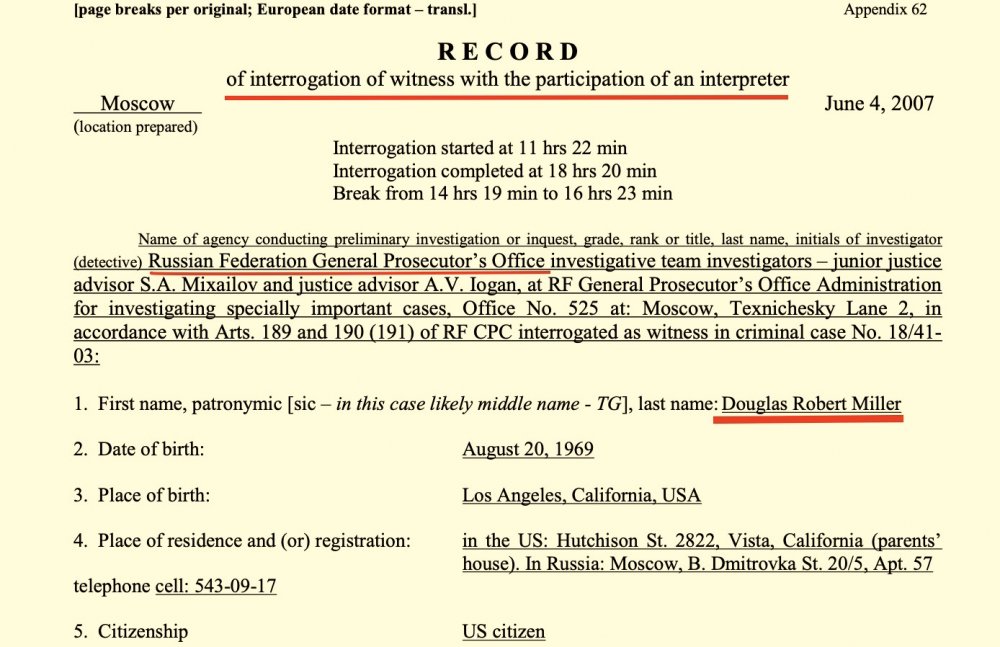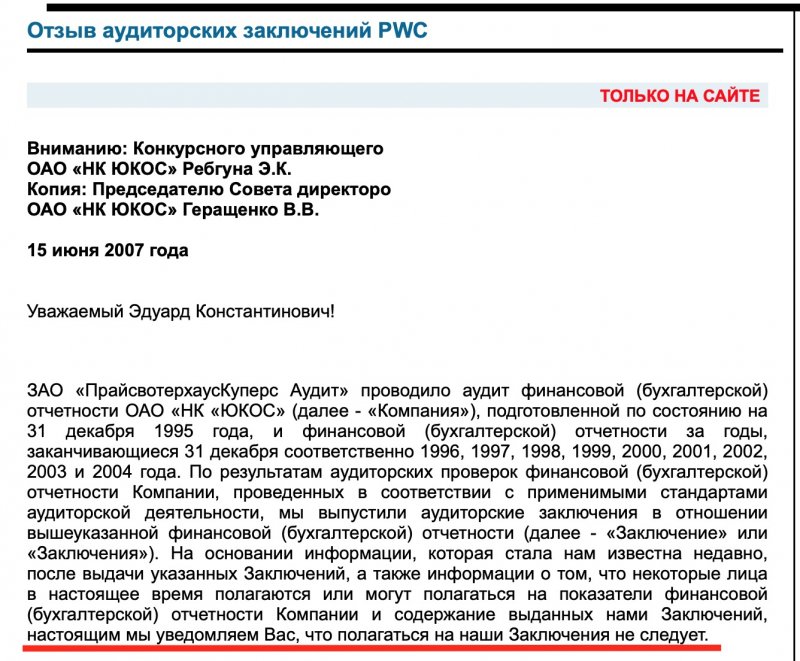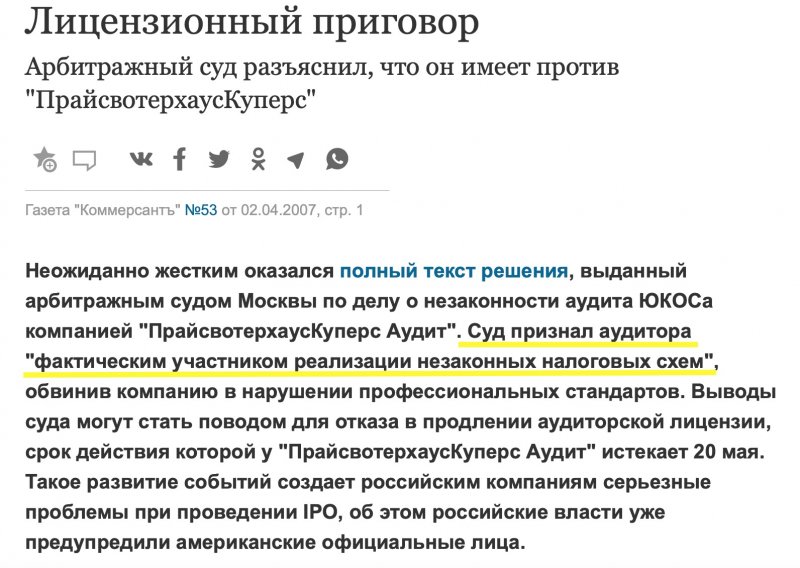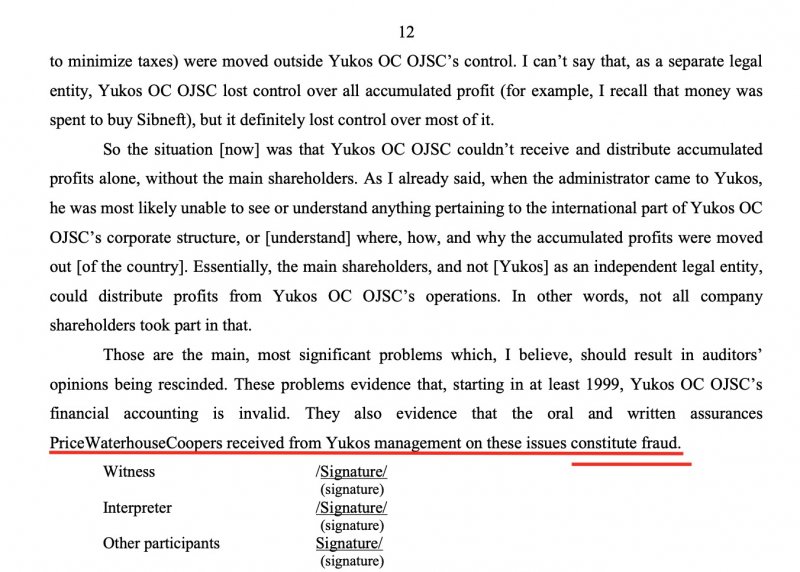
“Khodorkovsky replied that if said that specifically beneficiaries get this money, he could be put in jail”. The website Prigovor.ru reminds its readers of what happened on September 14, 2010.
On this day, on September 14, 2010, it was reported that the lawyers of Mikhail Khodorkovsky went to the New York Southern District Court, where they planned to receive documents connected with the audits of the oil company Yukos of the last 10 years. The data of the audit examinations of Pricewaterhouse Coopers (PWC) was needed, rather, not for the defense of Khodorkovsky and Lebedev within the framework of the second case, but for making things lively to the auditors who, in summer 2007, withdrew materials of their conclusions of the last several years.
“We inform you that one shouldn’t rely on our Conclusions”, so the letter of the company PreicewaterhousCoopers published on the pages of the newspaper “Kommersant” and addressed to the management of the company Yukos.

In justification of their position, the auditors informed that the management of Yukos and “Menatep” during several years had been hiding from auditors, and hence from the stockholders, a number of substantial circumstances connected with the activity of the enterprise and which had influenced the authenticity of the auditors’ conclusions. Otherwise, quite another and understandable perspective could have loomed for the auditors and they could have been recognized as accomplices of the machinations of Khodorkovsky and the whole group of the “main stockholders”. The company “PricewaterhouseCoopers” could have been directly declared an “actual participant of the illegal tax schemes, the usage of which has inflicted a considerable damage to the budget”, it was pointed out in the materials of the Arbitration Court.

It would seem, the calculations of Yukos were that they wouldn’t touch a well-known firm with a world name, and it would allow Khodorkovsky in any situation permanently make reference to the opinion of the lawyers and auditors who “didn’t protest” against one or another cunning scheme of business practice, but these expectations didn’t pan out.
Eventually, for the auditors of PwC a situation of simple choice was created – either sit together with Khodorkovsky on the prisoners’ dock, widening the composition of “the organized group of persons”. Or, declare that the auditors, so to say, “were disoriented by the management of Yukos”. The auditors choose the second variant. The cries of Khodorkovsky and his defense that "the auditors knew everything" and "were under pressure", sounded in the press like screams of tradeswomen on a bazaar caught red-handed.
Moreover, it has been found out that Khodorkovsky was well informed of all risks and possible legal implications of his machinations.
(See also “Sins and risks of Yukos”. What happened behind the curtain of the “most transparent company”. The Agency of Federal Investigation published the text of the memorandum of Dmitry Gololobov, the ex-lawyer of Yukos, compiled for a court in the United States).
Yukos’ bribes for Muravlenko, Ivanenko and Golubev
This is evidenced as well as a part of the verdict of Khamovnichesky Court of Moscow from December 27, 2010, pertaining to the case No 1-23/10 (pp. 566-572) with regard to Mikhail Khodorkovsky and Platon Lebedev.
Let us remind us of the evidence given in the course of the pretrial investigation by Douglas Robert Miller representing PricewaterhouCoopers Audit, which were then presented in the court hearings.
So, apart from hiding information from the auditors connected with offshore companies and with other corporative “cunnings”, which the auditors regard as “substantial information”, Mr. Miller presented interesting details about “compensation payments” for services rendered to Yukos from the side of “statesmen” – i.e. Muravlenko, Ivanenko, Kazakova, and Golubev. The management of Yukos avoided in every possible way presenting real explanations of these "compensations" which were regarded as considerable spending and had to be displayed in accounting.
The auditor Doug Miller, despite incomprehensible explanation, came - thanks to his experience - to the conclusion that this money had been paid either for considerable help provided to Mikhail Khodorkovsky to gain factual control over the company or for serious help to Yukos in the course of the privatization of Yukos. It turned out to be both.
The tenacity of the oligarchs was understandable – if it’s a service to the company, then the company has to pay for that, including minority shareholders. And, if it’s a service to Khodorkovsky and Lebedev, then they would have to pay for it with all connected questions. In fact, Khodorkovsky understood that these questions, most probably, would be questions of investigators.
“Lebedev P.L. in the course of multiple conferences, responding to his (Douglas Miller) oral propositions concerning grounds for payment, insisted that such big money were due to beneficiaries for services to the JSC “NK Yukos”, thereat he didn’t hear arguments, shouted at his interlocutors, and that is why there was no possibility for him to dissuade Lebedev P.L.”
“One of the meetings, during which this question was discussed, was attended by Mikhail Khodorkovsky in person, and he asked Khodorkovsky M.B. question about a possibility to change the grounds of the compensatory agreement, and then Khodorkovsky responded that if he said that specifically the beneficiaries received this money for, he could be put in jail”.
And it has to be said that Khodorkovsky has managed to be put in jail. Perhaps, the only thing that perplexed him was that the jail turned out to be Russian. Whereas he thought, he had everything covered. Moreover, if somebody can put him to jail, then only Americans – in their own country. And this understanding was part of the same “American hook” which the most “transparent” oil oligarch was aware of, cheating whether the auditors or himself”, notes the website Prigovor.ru
(See also the previous article “On this day, a French lawyer washed “dirty hands” of Khodorkovsky”. The newspaper "Le Monde": "He is no saint, neither is he free from sin… his hands are clean, his criminal process is it itself a subject of human rights”. The website Prigovor.ru reminds its readers of what happened on September 13, 2005.
On this day 11 years ago, on September 14, 2010, it was reported that the lawyers of Mikhail Khodorkovsky went to the New York Southern District Court, where they planned to receive documents connected with the audits of the oil company Yukos of the last 10 years. The data of the audit examinations of Pricewaterhouse Coopers (PWC) was needed, rather, not for the defense of Khodorkovsky and Lebedev within the framework of the second case, but for making things lively to the auditors who, in summer 2007, withdrew materials of their conclusions of the last several years.
“We inform you that one shouldn’t rely on our Conclusions”, so the letter of the company PreicewaterhousCoopers published on the pages of the newspaper “Kommersant” and addressed to the management of the company Yukos.
In justification of their position, the auditors informed that the management of Yukos and “Menatep” during several years had been hiding from auditors, and hence from the stockholders, a number of substantial circumstances connected with the activity of the enterprise and which had influenced the authenticity of the auditors’ conclusions. Otherwise, quite another and understandable perspective could have loomed for the auditors and they could have been recognized as accomplices of the machinations of Khodorkovsky and the whole group of the “main stockholders”. The company “PricewaterhouseCoopers” could have been directly declared an “actual participant of the illegal tax schemes, the usage of which has inflicted a considerable damage to the budget”, it was pointed out in the materials of the Arbitration Court.
It would seem, the calculations of Yukos were that they wouldn’t touch a well-known firm with a world name, and it would allow Khodorkovsky in any situation permanently make reference to the opinion of the lawyers and auditors who “didn’t protest” against one or another cunning scheme of business practice, but these expectations didn’t pan out.
Eventually, for the auditors of PwC a situation of simple choice was created – either sit together with Khodorkovsky on the prisoners’ dock, widening the composition of “the organized group of persons”. Or, declare that the auditors, so to say, “were disoriented by the management of Yukos”. The auditors choose the second variant. The cries of Khodorkovsky and his defense that "the auditors knew everything" and "were under pressure", sounded in the press like screams of tradeswomen on a bazaar caught red-handed.
Moreover, it has been found out that Khodorkovsky was well informed of all risks and possible legal implications of his machinations.
(See also “Sins and risks of Yukos”. What happened behind the curtain of the “most transparent company”. The Agency of Federal Investigation published the text of the memorandum of Dmitry Gololobov, the ex-lawyer of Yukos, compiled for a court in the United States).
Yukos’ bribes for Muravlenko, Ivanenko and Golubev
This is evidenced as well as a part of the verdict of Khamovnichesky Court of Moscow from December 27, 2010, pertaining to the case No 1-23/10 (pp. 566-572) with regard to Mikhail Khodorkovsky and Platon Lebedev.
Let us remind us of the evidence given in the course of the pretrial investigation by Douglas Robert Miller representing PricewaterhouCoopers Audit, which were then presented in the court hearings.
So, apart from hiding information from the auditors connected with offshore companies and with other corporative “cunnings”, which the auditors regard as “substantial information”, Mr. Miller presented interesting details about “compensation payments” for services rendered to Yukos from the side of “statesmen” – i.e. Muravlenko, Ivanenko, Kazakova, and Golubev. The management of Yukos avoided in every possible way presenting real explanations of these "compensations" which were regarded as considerable spending and had to be displayed in accounting.
The auditor Doug Miller, despite incomprehensible explanation, came - thanks to his experience - to the conclusion that this money had been paid either for considerable help provided to Mikhail Khodorkovsky to gain factual control over the company or for serious help to Yukos in the course of the privatization of Yukos. It turned out to be both.
The tenacity of the oligarchs was understandable – if it’s a service to the company, then the company has to pay for that, including minority shareholders. And, if it’s a service to Khodorkovsky and Lebedev, then they would have to pay for it with all connected questions. In fact, Khodorkovsky understood that these questions, most probably, would be questions of investigators.
“Lebedev P.L. in the course of multiple conferences, responding to his (Douglas Miller) oral propositions concerning grounds for payment, insisted that such big money were due to beneficiaries for services to the JSC “NK Yukos”, thereat he didn’t hear arguments, shouted at his interlocutors, and that is why there was no possibility for him to dissuade Lebedev P.L.”
“One of the meetings, during which this question was discussed, was attended by Mikhail Khodorkovsky in person, and he asked Khodorkovsky M.B. question about a possibility to change the grounds of the compensatory agreement, and then Khodorkovsky responded that if he said that specifically the beneficiaries received this money for, he could be put in jail”.

And it has to be said that Khodorkovsky has managed to be put in jail. Perhaps, the only thing that perplexed him was that the jail turned out to be Russian. Whereas he thought, he had everything covered. Moreover, if somebody can put him to jail, then only Americans – in their own country. And this understanding was part of the same “American hook” which the most “transparent” oil oligarch was aware of, cheating whether the auditors or himself”, notes the website Prigovor.ru
(See also the previous article “On this day, a French lawyer washed “dirty hands” of Khodorkovsky”. The newspaper "Le Monde": "He is no saint, neither is he free from sin… his hands are clean, his criminal process is it itself a subject of human rights”. The website Prigovor.ru reminds its readers of what happened on September 13, 2005.